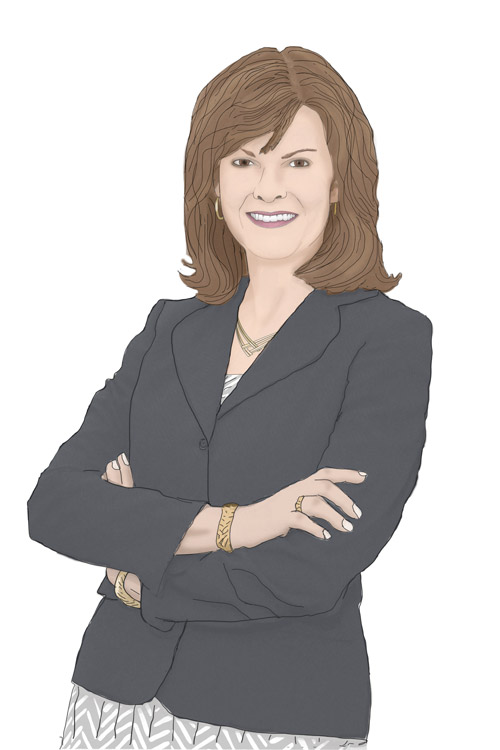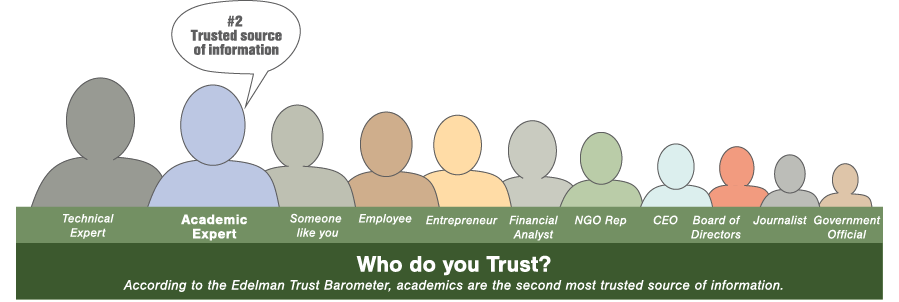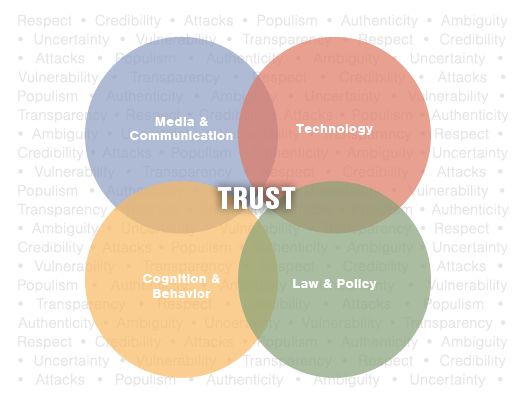When Diane McFarlin talks about the crisis of trust in society, she acknowledges the challenge but remains optimistic.
And why not? When University of Florida librarians searched for science on trust on the University of Florida campus, they found 139 research projects that touch on the topic.
As dean of the College of Journalism and Communications and the leader of UF’s Consortium on Trust in Media and Technology, that critical mass of scholarship heartens her, as does a 2019 statistic from the Edelman Trust Barometer that shows academic experts are the second most trusted source of information.
“We have a great platform here to do meaningful work,” McFarlin says. “If we already have a reservoir of trust, we’re positioned to make a greater difference than any other type of professional.”

McFarlin was already working on the trust front, especially considering that the Edelman Trust Barometer puts the media on the lower end of the trust scale. The college convened a national summit last summer that brought together journalists and scholars in behavioral, cognitive and social sciences to discuss ways to help journalists reconnect with the communities they serve.
The discussions, McFarlin says, showed her that collaborations at the intersections of disciplines could yield important insights. Focusing on just the media, she thought, would amount to coming up short in solving the trust crisis.
“We convened a community of scientists who’d never worked together before, and we were pitching questions to them and listening to them, looking at trust through their lens,” McFarlin says. “It was eye opening. Multidisciplinary teams can take a problem and teach each other and build an approach that is brand new because of the mix of scholarship.
“Eventually, we hope every unit on campus will be involved.”
A common denominator in the trust crisis is the impact of technology on the relationships people have with each other and with institutions. So McFarlin asked Juan Gilbert, chair of the Department of Computer & Information Science & Engineering in the Herbert Wertheim College of Engineering, to join forces. Technology has accelerated the decline in trust, so human-centered computing will be important to figuring out how trust and technology interact, McFarlin says. Social scientists, too, will be needed, to discover how people perceive truth in a world where truth seems to be a moving target.

“The potential is great when you think about technologists sitting down with social scientists and communications scientists and what-iffing,” McFarlin says.
The college itself, already a training ground for generations of journalists, can function as a testbed for new research. WUFT, UF’s public television station, for example, has the largest audience in a 21-county region. The college also is home to the STEM Translational Communication Center and the Center for Public Interest Communications. Science on trust also will be incorporated into the curriculum for the college’s students, digital natives who are comfortable with technology but who need to be educated on how to become trustworthy practitioners in a media environment permeated by disinformation and fake news.
Technologies such as virtual reality and mixed virtual reality can be used for good, as in the college’s Media Effects and Technology Laboratory, which uses VR to foster understanding of decline in the health of oceans and the consequences of climate change. Verification tools, which allow information consumers to judge the veracity of news, are another robust research arena.

“Technology has changed our lives for the better,” McFarlin says. “But a strength can also be a weakness.”
McFarlin is searching for a director for the consortium who already has a “seat at the table” for discussions on trust in society. The director will be charged with building one of the largest ecosystems in the country, perhaps the world, conducting research on trust.
“The word crisis is frequently used because it is, in fact, a crisis for modern society,” McFarlin says.
Trust, once lost, is hard to restore, and McFarlin says the attempt is worthy of being called a moonshot.
“It’s an ambitious project, but moonshots have ambitious, if not audacious, goals,” McFarlin says. “We may not achieve the goals we’re looking to achieve, but the journey will be revelatory.
“What we’ll learn along the way will enable our institutions to do a better job of being trustworthy and enable the public to do a better job of determining what institutions are trustworthy.”
Collaborators:
- College of Liberal Arts and Sciences
- Department of Computer & Information Science & Engineering
- Informatics Institute
- George Smathers Libraries
- Student Services
Source:
This article was originally featured in the Summer 2019 issue of Explore Magazine.

